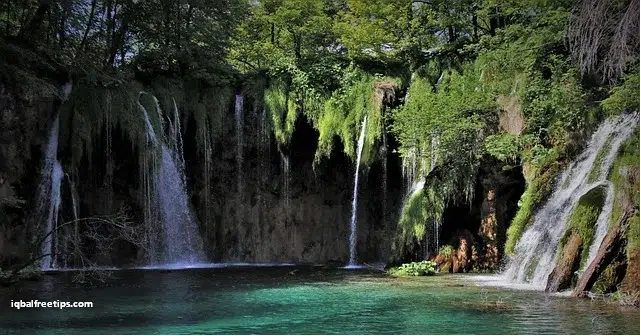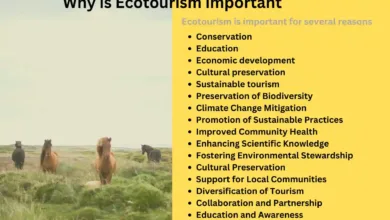
Environmental Benefits of Ecotourism
Ecotourism is one of the fastest-growing sectors in the world and a significant employer, contributing significantly to the development of many nations, particularly developing ones. Ecotourism is a method of promoting the nation’s tourism industry that is friendly to the environment. The environmental benefits of ecotourism are is an important aspect of sustainable development.
Promoting environmentally responsible policies that preserve the integrity of indigenous lands and benefit is necessary as the globe fights climate change and harm to natural beauty. Traveling exclusively to natural locations, fostering environmental awareness, minimizing the negative effects of tourism on environmental and social aspects, and respecting local customs are the main distinctions between ecotourism and traditional tourism.
Environmental Benefits of Ecotourism
One of the main environmental benefits of ecotourism is that it can help to conserve natural areas and biodiversity. By providing an economic incentive for local communities to protect and manage natural resources, ecotourism can help to reduce the pressure to exploit these resources for other purposes, such as logging or mining.
Ecotourism Reduces Environmental Impacts
Ecotourism can also help to reduce the environmental impacts of tourism by promoting sustainable practices, such as the use of low-impact transportation and accommodation options, the conservation of water and energy resources, and the reduction of waste. These practices can help to minimize the negative impacts of tourism on local ecosystems and the natural environment.
Environmental Benefits of Ecotourism; Creating Awareness
Another environmental benefit of ecotourism is that it can help to raise awareness about environmental issues and promote sustainable practices more broadly. By providing opportunities for tourists to learn about and engage with the natural environment, ecotourism can encourage people to be more environmentally responsible in their own lives.
Ecotourism and Biodiversity
Overall, ecotourism can play a significant role in promoting the conservation of natural areas and biodiversity, while also minimizing the environmental impacts of tourism and raising awareness about environmental issues. By supporting sustainable tourism practices, ecotourism can help to ensure that the benefits of tourism are shared by local communities and the natural environment, and that tourism can be enjoyed in a way that is both responsible and sustainable.
Environmental Benefit of Ecotourism; Biodiversity
The environmental travel zone is becoming increasingly attractive for another important reason. Due to human interference and habitat loss, wild creatures are going extinct. Wild creatures are losing their habitat, and forests are being permanently lost. We can avoid the extinction of endangered creatures and protect them for future generations by maintaining wildlife sanctuaries and promoting ecotourism.
Ecotourism Protect the Native Flora and Fauna
Therefore, ecotourism is different from other types of vacations in that it emphasizes protecting our native flora and fauna, which can be crucial to preventing the endangerment or extinction of several animal and plant species worldwide. Ecotourism has the advantage of attempting to preserve the native fauna and flora. While other forms of tourism, particularly mass tourism, do not give much thought to the environment, ecotourism aims to preserve our natural habitats and the natural living conditions of numerous animals and plants while also providing tourists with the chance to travel to those breathtaking natural locations.
Ecotourism Preserve Nature
Ecotourism aims to preserve our natural ecosystems as much as possible in addition to protecting our local flora and wildlife. To provide animals and plants enough room to reproduce and live peacefully, for instance, some areas of nature reserves are frequently completely inaccessible to humans. In turn, our ecosystems can proceed with their nearly totally natural development.
Ecotourism Increase Employment
Increased employment and improved lifestyles can be achieved through ecotourism, Ecotourism is the source of generating income for the incompetent workforce. In addition, ecotourism can support the establishment and management of protected areas, such as national parks and wildlife reserves, which can help to conserve more workforce.
Environmental Benefits of Ecotourism
One of the many environmental benefits of ecotourism is that it can help to reduce the environmental impacts of tourism. By promoting sustainable practices, such as the use of low-impact transportation and accommodation options, the conservation of water and energy resources, and the reduction of waste, ecotourism can minimize the negative impacts of tourism on local ecosystems and the natural environment. This is especially important in areas where there may be a high level of tourist activity, as the environmental impacts of tourism can be significant if not properly managed
Ecotourism Creates a Cultural Sense
Ecotourism can provide visitors with a sense of accomplishment and a way to help the environment. Customers also gain from ecotourism when tourist destinations are preserved so they can be visited again in the future. Ecotourism benefits travelers by educating them about the importance of environmental preservation and raising their degree of intercultural understanding.
The environmental benefits of Ecotourism also include the protection of cultural heritage and promotion of cultural diversity. This inturn helps in secure tourism and exponential community growth.
Ecotourism is the Source of Jobs for Locals
The advantages of ecotourism to host communities are significant and include raising living standards through more jobs for locals and various government and non-government organization-led projects, preservation of local areas, and providing long-term solutions to poverty challenges.
Ecotourism and Cross-Culture
Increasing one’s cross-cultural proficiency through ecotourism. Engaging in ecotourism will strengthen visitors’ familiarity with numerous facets of local culture, and this fact alone is a compelling argument for the usefulness of ecotourism.
Goals of Ecotourism
- Keeping special tourist attractions around for upcoming generations. The goal of ecotourism is to lessen the negative effects of tourism while, on the other hand, generating benefits for a place because of tourism activities.
- Ecotourism causes people to become more aware of and sensitive to a variety of environmental challenges, such as climate change, deforestation, and the depletion of natural resources. This shift will benefit both the environment and the future of the persons involved.
Role of Ecotourism in the Reduction of Poverty
Ecotourism helps the development of enduring sources of income for tourist locations. Through increased local workforce participation in ecotourism services aimed at raising the standard of living for locals. Ecotourism can successfully contribute to the reduction of poverty in local areas.
Ecotourism can help to build support and encourage the adoption of more sustainable practices both within the tourism industry and beyond. The environmental benefits of ecotourism make it one of the most popular types of tourism. The environmental benefits of ecotourism include wildlife conservation, cultural protection, protection of cultural heritage, and much more.
May you like:
Importance of Ecotourism in the Tourism Industry
What are the Important Roles of Ecotourism in the Community?




